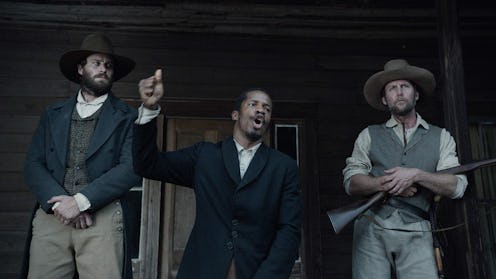
When you're in charge of your own finances, every day you make decisions on how and where you're going to spend your money. You probably know how powerful your dollars are and direct them accordingly, whether that means buying local, being environmentally conscious, or supporting your favorite independently-owned store. For some, this consciousness may extend to entertainment, i.e. purchasing albums, tickets, or streams from artists and companies you like and avoiding doing that for those you don't. One particular fall movie release may present a dilemma for responsible movie-goers: Birth Of A Nation , the Nat Turner biopic directed by and starring Nate Parker. Should you see Birth Of A Nation because the story it tells is important, or should you avoid it because of the accompanying controversy surrounding Parker? Ultimately, that's your personal decision to make, but there are a few factors you may want to keep in mind.
In 1999, Parker and his Birth Of A Nation co-writer Jean McGianni Celestin were accused of raping a young woman. Their accuser claimed that she had been unconscious and unable to give consent during an encounter where both men allegedly had sex with her at the same time. She also claimed that the men harassed her after she went to police. Parker was never convicted of the charges. Celestin was, but his conviction was turned over on appeal in 2005 (both men maintain that the sex was consensual). As reported by Variety, the accuser took her own life in 2012, and in a recent 60 Minutes interview, Parker declined to apologize for the alleged incident, citing the fact that he was cleared of the charges as a reason he does not have to feel responsible. To Ebony, meanwhile, Parker spoke about his developing definition of consent and said that, to a younger version of himself, silence from his partner was not viewed a reason to stop having sex. "Back then, it felt like... I’ll say this: at 19, if a woman said no, no meant no. If she didn’t say anything and she was open, and she was down, it was like how far can I go?" Parker said. "If I touch her breast and she’s down for me to touch her breast, cool. If I touch her lower, and she’s down and she’s not stopping me, cool. I’m going to kiss her or whatever. It was simply if a woman said no or pushed you away that was non-consent."
The accusations in Parker's past haven't, so far, impeded his progress in the entertainment industry. He's worked fairly steadily as an actor, and Birth Of A Nation's Sundance debut in January put him on the map for many people. The historical drama stars Parker as Turner, a slave and preacher who led a rebellion in Virginia in 1831, and it features a primarily black cast. It's the kind of movie that brings home awards, and, at one point, seemed like the strongest reason to hope that 2017 won't be another #OscarsSoWhite situation. When asked what he thought about moviegoers possibly boycotting the film due to the accusations surrounding him, Parker told 60 Minutes, "I think that Nat Turner — as a hero what he did in history — it's bigger than me. I think it's bigger than all of us."
And it's true that the allegations do not negate the importance of the story Parker is telling. But it's also true that allegations of sexual assault should not be taken lightly — though we must also consider that Parker maintains his innocence and was cleared of all charges. According to RAINN, 23.1 percent of female undergraduate students will be raped or assaulted at school. Four out of five won't report that assault, because they don't think they'll be believed, fear payback, or would rather not get the perpetrator into trouble, among other reasons. It's crucial that we acknowledge these statistics about college campuses, and understand how important it is to treat allegations of sexual assault seriously. For some people, that may mean not supporting Parker or his film, because of the allegations against him and his comments on consent.
But choosing not to see this movie doesn't have to mean tossing its subject, or its importance as a rare mainstream film starring a primarily black cast, to the side. Birth Of A Nation isn't the only source of information on Turner, nor is Parker the only black filmmaker with work out there to support. If you'd like to learn more about Turner and the United States in which he lived without purchasing a ticket to Birth Of A Nation, you could read The Fires of Jubilee: Nat Turner's Fierce Rebellion by Stephen B. Oates or The Confessions Of Nat Turner written by the man himself. At the movies, you could check out the documentary Maya Angelou: And Still I Rise, directed by Rita Coburn Whack, or the indie drama Moonlight, directed by Barry Jenkins, both of which have been well-reviewed.
Yet some people might choose to see Birth of a Nation in theaters and not let the allegations about Parker impact their viewing experience. That's perfectly fine; the release of Birth Of A Nation is an incredibly complicated situation which can be approached from countless viewpoints and with different life experiences. Ultimately, it's up to you to decide how you'd like to spend your money and what art deserves your support.
Image: Fox Searchlight